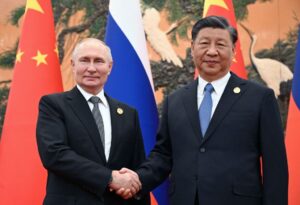When Donald Trump introduced a series of tariffs on Chinese goods, just over five years ago, Joe Biden was among his fiercest critics. Trump, he said, was “crushing” American farmers, workers and consumers by sparking an “irresponsible trade war”, and he vowed to reverse his “senseless policies”. But once in power, Biden did the exact opposite: he actually strengthened Trump’s protectionist policies, launching “a full-blown economic war on China”.
Last week, that war escalated to near-nuclear level as the White House announced massive tariff hikes on a raft of Chinese imports — including 25% on steel and aluminum, 50% on semiconductors and solar panels, and a staggering 100% on electric vehicles (EVs). The move, they say, is in response to “China’s unfair trade practices”. China, they say, is using hefty government subsidies to flood that Beijing is flooding global markets with artificially low-priced exports. By imposing its swingeing tariffs, the US hopes to create “a level playing-field in industries that are vital to our future”, and “ensure America leads the world” in these sectors.
It’s pretty ironic that Biden is attempting to level the playing-field by embracing similar tactics to Beijing. His administration’s much-vaunted Inflation Reduction Act, includes almost $400 billion in subsidies (through grants, loans and tax credits) aimed at boosting the cleantech sector. So Biden’s attempts to paint China as a rogue nation using “non-market practices” to “game the system” seem driven by fear that the Chinese subsidies risk nullifying the effect of America’s own subsidies.
US Secretary of the Treasury Janet Yellen acknowledged as much when she said that “China is really not playing by the rules in the sense that they have enormous subsidies in critical areas of advanced manufacturing” and “[Biden] wants to make sure that the stimulus that’s being provided through the Inflation Reduction Act support[s] these industries”. She seemed blissfully unaware of contradictory nature of her statement, barely concealed by the doublespeak: China “subsidises” its industries (bad), while the US “supports” them (good).
But, then, the idea of America as a bastion of the free market, whose corporations achieved global success simply by relying on the animal spirits of capitalism and the sheer ingenuity of garage inventors à la Steve Jobs, is largely a myth. Everyone knows that Silicon Valley’s transformation into a hotbed of innovation, and the subsequent rise of the US tech industry, was made possible thanks to massive funding from the US government and military during the Cold War. Elon Musk is only the latest in a line of supposedly self-made garage inventors who have actually built their tech empire with the help of billions of dollars in US government subsidies. Just last year Tesla received $7.5 billion from the US government.
China, then, isn’t really doing anything different from what the US has always done. But America is riled because China is winning. And having taken up the role of “free trade” defender — accusing the Biden administration of “imped[ing] the normal functioning of global industrial and supply chains” — Beijing is forcing the US to take an increasingly protectionist stance.
This peculiar reversal of roles is paradigmatic of the significant global economic and geopolitical power shift underway. “Free trade” generally tends to benefit the dominant economic power, at the expense of weaker economies. It is no coincidence that the US began preaching “free trade” only after it achieved economic dominance, in the mid-20th century, after resorting to heavily protectionist measures to support its manufacturing sectors, just as Britain had done before it.
Today, however, the world’s manufacturing powerhouse is no longer the US. It is China. America’s embrace of protectionism is, therefore, an admission of weakness, as it is demoted to no-longer-hegemonic status. In this respect, it makes sense for the US to not want to be completely dependent on China in increasingly critical manufacturing sectors, and to build up its own cleantech industrial base.
To shore this industry up, the US has been trying to nurture a domestic solar supply chain through a mix of tax incentives and tariffs for over a decade — but so far has failed abysmally. As the French entrepreneur and political commentator Arnaud Bertrand noted, while the tariffs did considerably reduce the number of Chinese solar panels coming to the US (with an 86% drop over the 2012-2020 period), the billions in subsidies, from first Obama and then Biden, did not revitalise the US solar industry.
On the contrary, the American global market share of the solar industry has considerably decreased since the original tariffs were placed on Chinese solar panels — from 9% in 2010 to 2% today. Meanwhile, China’s share of the industry rose from 59% to 78%. There’s no reason to believe that the recent tariff increase will reverse this trend. There’s even less hope that they will help spur a domestic EV industry.
There’s also a catch-22 situation at play here. Because by shielding American car manufacturers from Chinese competition, any development is likely to be hindered. But without the tariffs, US car manufacturers will struggle to survive the decade since Americans cars cost between double or triple the amount of their Chinese equivalents. So the government may artificially prop up the American auto industry for a few more years, at the expense of American consumers — but by doing so, it is only delaying its death, not saving it.
The idea that the tariffs will help America “lead the world” in this or other sectors where China already controls most of the global market share — such as steel, aluminium and EVs — is an economically illiterate one. Especially when you consider that the US market represents a relatively small share of Chinese global sales, and that America’s declining global status means it can no longer impose its will on other countries. It’ll be lucky if it can get its sub-imperial vassals in Europe and Asia to get on board with its short-sighted trade war.
In fact, Biden’s EV tariff hike is already further weakening America’s crumbling power-house status. Those EU member states with big automotive ties to China, such as Germany and Sweden, have voiced their objections — reluctant to match the United States, or to put tariffs on the imports at all. “We don’t want to dismantle global trade, that’s a stupid idea”, Swedish Prime Minister Ulf Kristersson said. “Punitive tariffs as a one-size-fits-all solution is not a good idea for importing and exporting countries.”
When we consider what kind of technologies are being targeted by the tariffs, the optics are even worse for Biden. For years he has presented himself as a champion of climate policies and emphasised the need to move towards low-emission technologies, one of the stated aims of the Inflation Reduction Act. Yet he is now attempting to punish China for managing to produce low-cost green tech, including EVs, that could turbo-charge the world’s next industrial revolution. Indeed, China has been able to achieve astounding results in this sector in large part because it has embraced much more ambitious green industrial policies than the West. Moreover, Biden’s imposition of these tariffs risks hindering the adoption of low-emission technologies by American businesses and consumers — and thereby thwarting the US’s own climate targets. It’s a messy own goal.
Those sceptical of the need for climate policies and their achievements probably don’t think this is a big deal. But it is a big deal for a lot of people — especially Biden voters. And this policy could cost him those votes, even though probably aimed at shoring up support for the President by showing voters that he is tough on China, could cost him votes.
The economist Dani Rodrik captured the sentiment of many in the progressive camp when he said: “Put up tariffs if you must, but the moral, economic, environmental arguments are on the side of those that subsidise green products, not those who want to tax them.” You don’t have to agree with him to understand the huge political gamble that Biden has taken by declaring a full-blown trade war on China, the unintended consequences of which could cost him his presidency and hammer the final nail in the coffin of America’s powerhouse status.
Disclaimer
Some of the posts we share are controversial and we do not necessarily agree with them in the whole extend. Sometimes we agree with the content or part of it but we do not agree with the narration or language. Nevertheless we find them somehow interesting, valuable and/or informative or we share them, because we strongly believe in freedom of speech, free press and journalism. We strongly encourage you to have a critical approach to all the content, do your own research and analysis to build your own opinion.
We would be glad to have your feedback.
Source: UnHerd Read the original article here: https://unherd.com/



